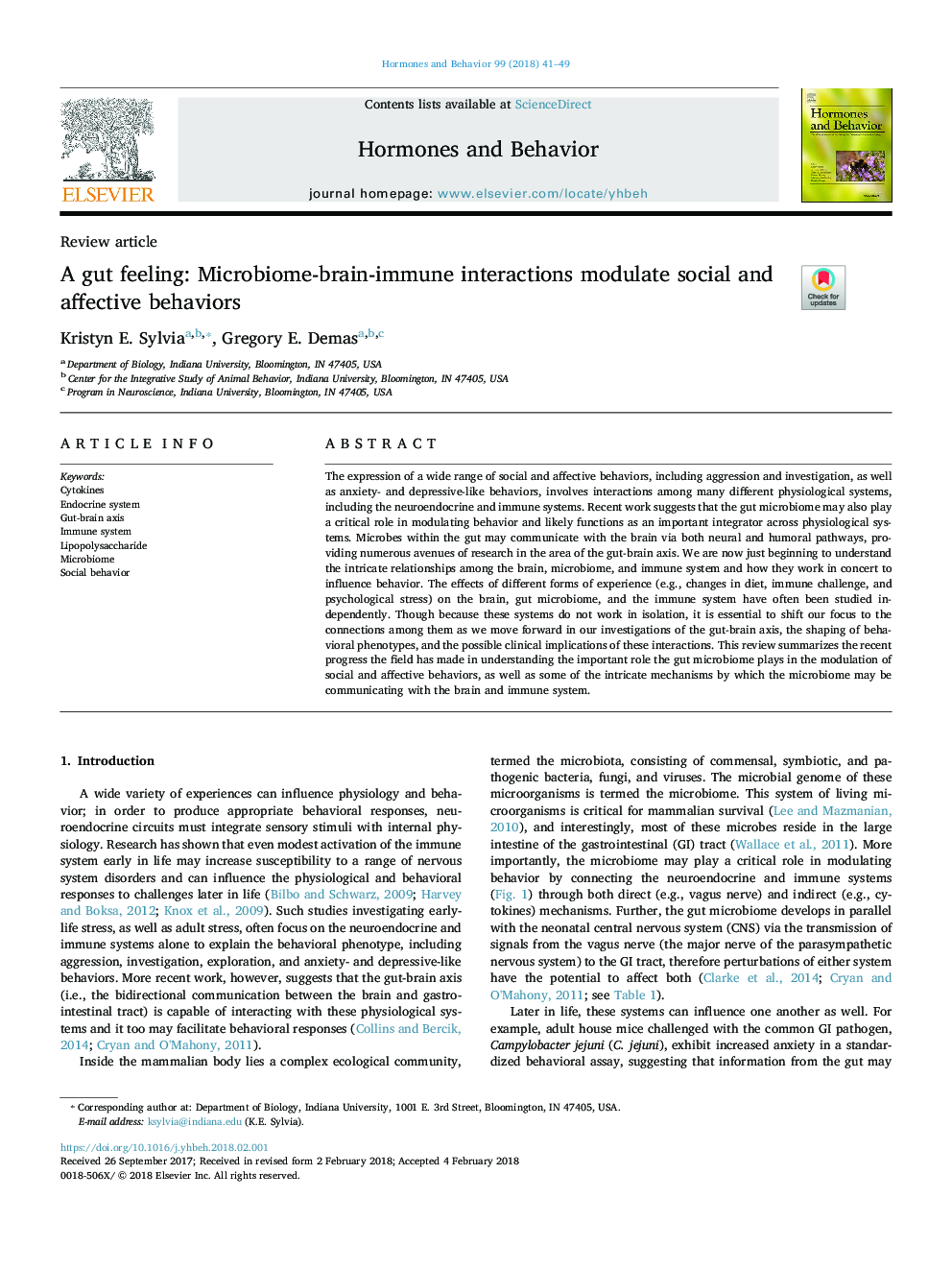| کد مقاله | کد نشریه | سال انتشار | مقاله انگلیسی | نسخه تمام متن |
|---|---|---|---|---|
| 6793918 | 1432741 | 2018 | 9 صفحه PDF | دانلود رایگان |
عنوان انگلیسی مقاله ISI
A gut feeling: Microbiome-brain-immune interactions modulate social and affective behaviors
ترجمه فارسی عنوان
احساسات روده: تداخلات ایمنی میکروبیوم و مغز موجب رفتارهای اجتماعی و عاطفی می شود
دانلود مقاله + سفارش ترجمه
دانلود مقاله ISI انگلیسی
رایگان برای ایرانیان
کلمات کلیدی
سیتوکین ها، سیستم غدد درون ریز، محور روده مغز، سیستم ایمنی، لیپوپلی ساکارید، میکروبیوم، رفتار اجتماعی،
ترجمه چکیده
بیان طیف گسترده ای از رفتارهای اجتماعی و عاطفی، از جمله تجاوز و تحقیق، و همچنین رفتارهای اضطراب و افسردگی، شامل تعامل در میان بسیاری از سیستم های مختلف فیزیولوژیکی، از جمله سیستم های نورولوژیک و سیستم ایمنی بدن است. کار اخیر نشان می دهد که میکروبیوم روده ممکن است نقش مهمی در تعدیل رفتار و توابع احتمالی به عنوان یک انتگرال مهم در سراسر سیستم های فیزیولوژیکی داشته باشد. میکروب ها در داخل روده ممکن است از طریق مسیرهای عصبی و هومورال با مغز ارتباط برقرار کنند و راه های متعدد تحقیق در محدوده محور روده و مغز را فراهم کنند. اکنون ما فقط درک روابط پیچیده میان مغز، میکروبیمار و سیستم ایمنی بدن و نحوه همکاری آنها برای تاثیر گذاشتن بر رفتار را درک می کنیم. اثرات اشکال مختلف تجربه (مثلا تغییرات در رژیم غذایی، چالش ایمنی و استرس روانی) بر مغز، میکروبیوم روده و سیستم ایمنی اغلب به طور مستقل مورد مطالعه قرار گرفته است. اگر چه به این دلیل که این سیستم ها در انزوا کار نمی کنند، تمرکز ما به ارتباطات بین آنها ضروری است، همانطور که ما در تحقیقات ما در محور روده و مغز، شکل گیری فنوتیپ های رفتاری و پیامدهای بالینی احتمالی این تعاملات . این بررسی خلاصه ای از پیشرفت های اخیر در زمینه درک نقش مهم در میکروبیوم روده در مدولاسیون رفتارهای اجتماعی و عاطفی و همچنین برخی از مکانیسم های پیچیده ای که می توان آن را با مغز و سیستم ایمنی ارتباط برقرار کرد.
موضوعات مرتبط
علوم زیستی و بیوفناوری
بیوشیمی، ژنتیک و زیست شناسی مولکولی
علوم غدد
چکیده انگلیسی
The expression of a wide range of social and affective behaviors, including aggression and investigation, as well as anxiety- and depressive-like behaviors, involves interactions among many different physiological systems, including the neuroendocrine and immune systems. Recent work suggests that the gut microbiome may also play a critical role in modulating behavior and likely functions as an important integrator across physiological systems. Microbes within the gut may communicate with the brain via both neural and humoral pathways, providing numerous avenues of research in the area of the gut-brain axis. We are now just beginning to understand the intricate relationships among the brain, microbiome, and immune system and how they work in concert to influence behavior. The effects of different forms of experience (e.g., changes in diet, immune challenge, and psychological stress) on the brain, gut microbiome, and the immune system have often been studied independently. Though because these systems do not work in isolation, it is essential to shift our focus to the connections among them as we move forward in our investigations of the gut-brain axis, the shaping of behavioral phenotypes, and the possible clinical implications of these interactions. This review summarizes the recent progress the field has made in understanding the important role the gut microbiome plays in the modulation of social and affective behaviors, as well as some of the intricate mechanisms by which the microbiome may be communicating with the brain and immune system.
ناشر
Database: Elsevier - ScienceDirect (ساینس دایرکت)
Journal: Hormones and Behavior - Volume 99, March 2018, Pages 41-49
Journal: Hormones and Behavior - Volume 99, March 2018, Pages 41-49
نویسندگان
Kristyn E. Sylvia, Gregory E. Demas,
